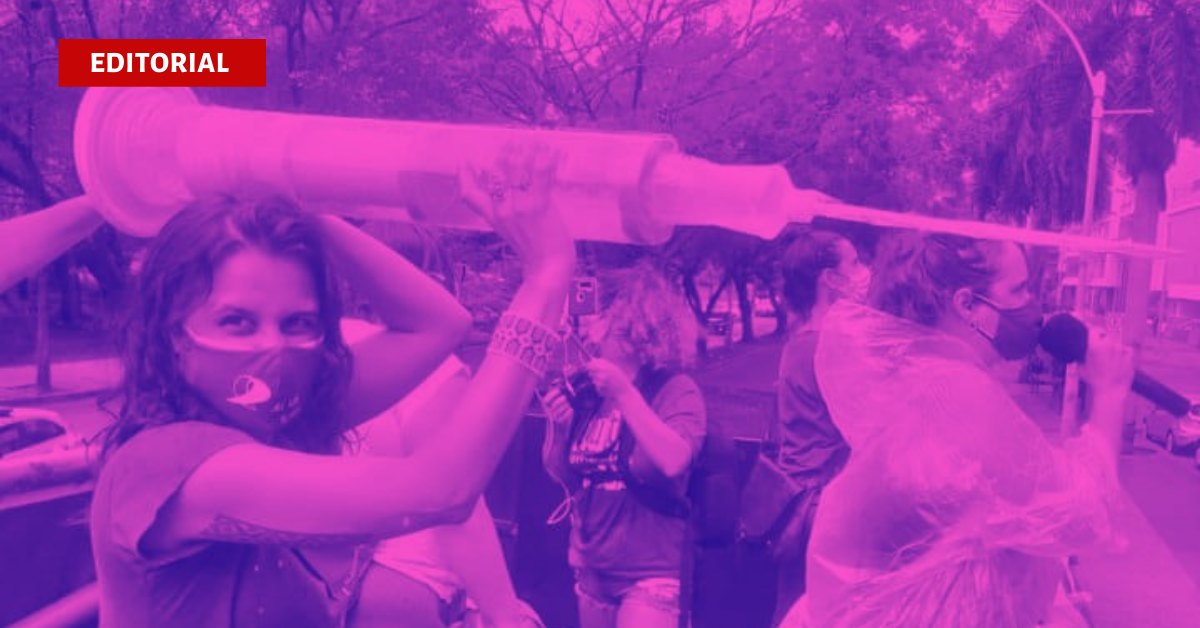In 2021, the 8th of March (8M) will be different. It will be a March marked by the worsening pandemic, record numbers of daily deaths, and the dramatic struggle for a life-saving lockdown against a government that has acted to promote misinformation and death. The threat of unemployment, inflation, and the return of hunger which affects families across the country, make this struggle a decisive one.
Throughout this whole health crisis, we have seen women around the world on the frontline raising resistance to the opportunism of the governments of the far-right that have tried to develop their conservative projects further through their attacks on reproductive rights, immigrants, indigenous peoples, blacks, Latinas and Latinos. The year 2020 was the stage for the struggle of women in the midst of the pandemic: the legalization of abortion in Argentina, Black Lives Matter in the United States in response to the murder of George Floyd, the toppling of racist statues in Britain, the demonstrations against gender violence in Mexico, the prominent role of women in the struggle against the coup in Bolivia, the mobilizations against rape in India, the women’s strike in Warsaw, and in Brazil the rallies for justice for Mari Ferrer* and in defense of the girl from Espirito Santo.**
Since the time of the explosion seen this (southern) Spring, feminism has been the reserve of hope for fighters all over the world. In the darkest moments, the prominence of women’s struggle was able to rekindle the confidence and courage of hundreds of thousands of people who, hand in hand, flooded the streets in defense of a new, fairer, and more egalitarian society.
The impact of five years of global feminist strikes has brought a breath of fresh air to social movements around the world. The questions raised by the international strikes and the struggles in Chile, Argentina, Spain, Mexico, and the United States around the importance of the work that women perform inside and outside the home have placed greater clarity on the role of women and the feminist movement during the spread of COVID-19. The attacks faced by women are similar all around the world, hence the need for a unified global response that follows the example of the “Manifesto towards the 8M Strike 2021” published by Feministas Transfronteirizas (Cross-border Feminists) this March and the coordination that is being prepared for 8M.
In Brazil, the “new normal” for women has translated into physical and mental overload, as well as an explosion in various forms of violence. Faced with this scenario, not even half of the meager resources intended for public policy have been used by the Ministry of Damares Alves (the reactionary, evangelical Minister for Women), who instead concentrates her efforts on the destruction of the achievements of the feminist movement in the country and the persecution of activists.
In the face of the politics of death orchestrated by Bolsonaro and his team, it is essential that women organize in the defense of life, vaccines, and emergency aid. Once again, the existence of the feminist united front for this 8M was essential. More than 80 organizations signed the national manifesto, expressing a broad unity around the demand that Bolsonaro and his entire government must go, for immediate vaccinations administered by the Unified Health System (SUS) for the entire population, and for the payment of emergency aid to ensure the measures of social isolation that are so necessary in this moment of health system collapse.
In order to preserve life, the feminist movement has diversified its actions and expanded them beyond traditional rallies. We will carry out a strong online campaign, with ‘lives’ (livestreams) and ‘tuitaços’ (twitter hashtag campaigns), that begins on Sunday 7 March. There will also be actions organized from local plenary meetings that will promote ‘carreatas’ (motorcade protests), installations in the cities, decentralized interventions in the territories, all of which will be coordinated over this month with support networks and solidarity campaigns.
In the face of the barbarism of Bolsonaro, women and feminism are once again putting themselves onto the frontline to defend lives.
Notes
* Mari Ferrer filed criminal rape charges against a local businessman in December 2018. At this trial, the defendant’s attorney repeatedly insulted and humiliated her while the judge and prosecutor sat in silence and said nothing, all of which was caught on video.
** The ‘girl from Espirito Santo’ is a ten-year-old girl who was raped for four years by her uncle. After becoming pregnant, she was initially denied an abortion at her local hospital, then subsequently won a judge’s ruling in favor of her right to abortion, only to be forced to travel hundreds of miles to get one. An anti-abortion activist illegally published her name and the hospital she was traveling to, and other anti-abortionists tried to blockade the hospital in an attempt to stop the abortion from taking place.
This article is an English translation of “8 de março: Mulheres contra a barbárie”, Esquerda Online (EOL), 07/03/2021.
Translation: Bobby Sparks




Comentários